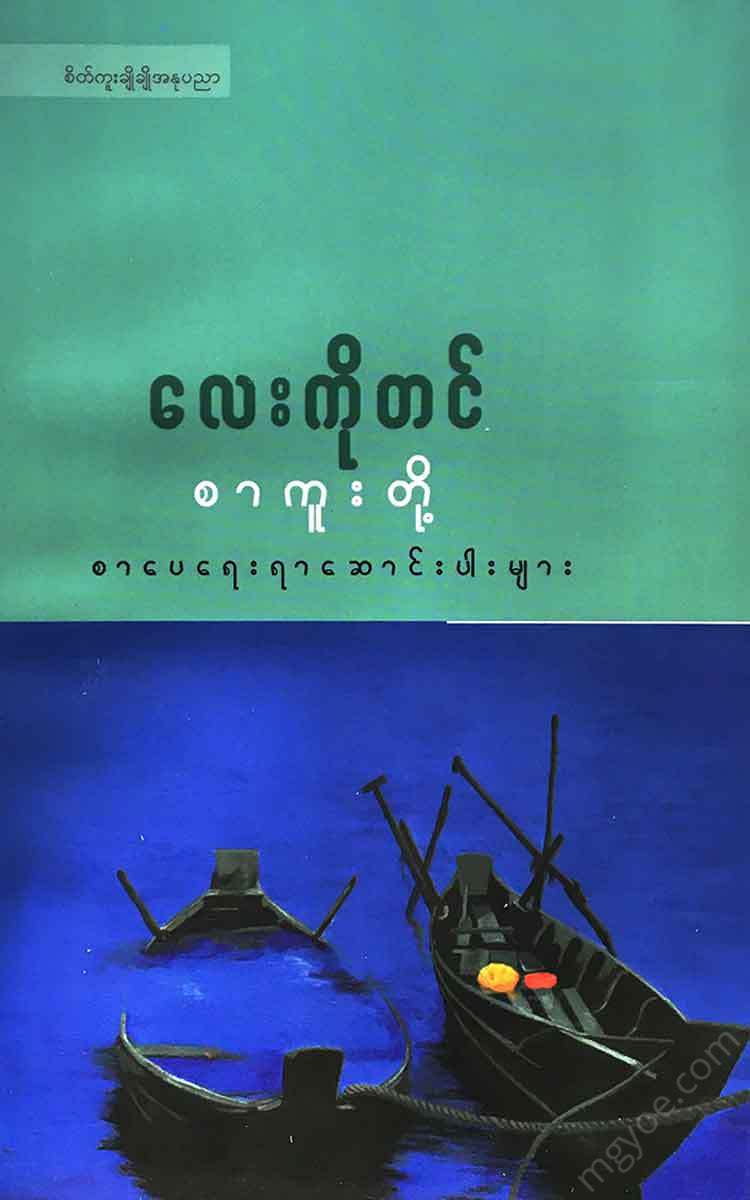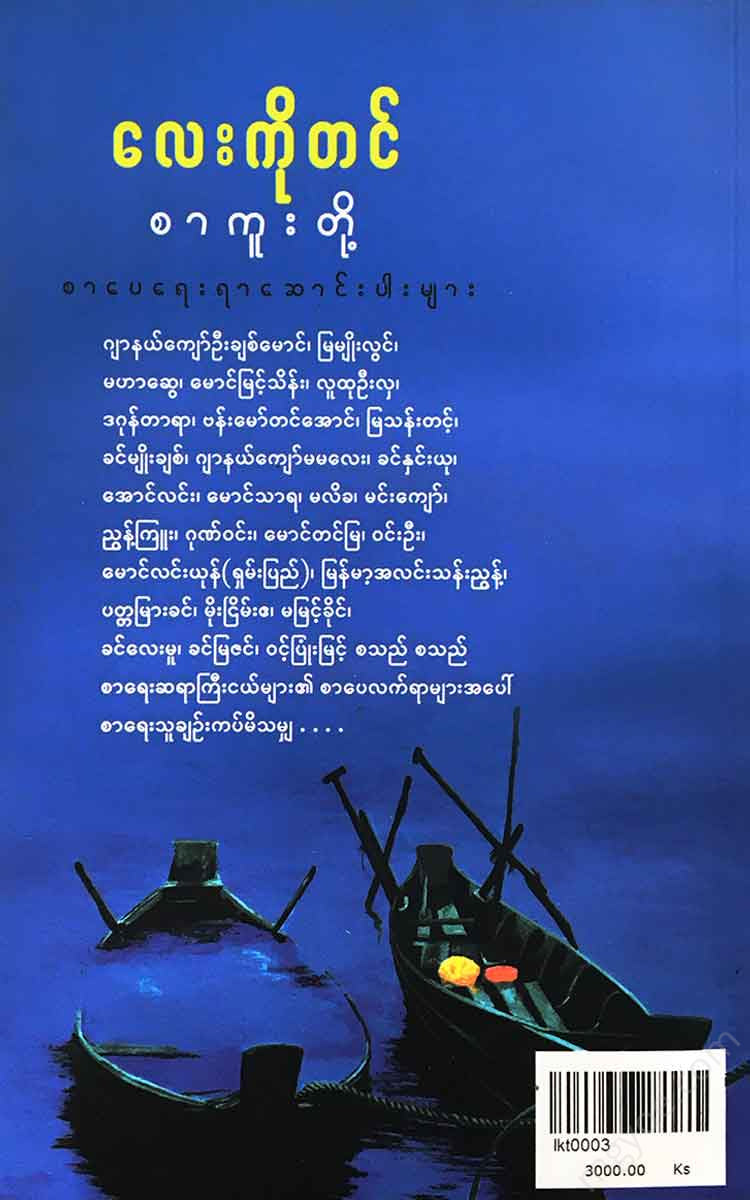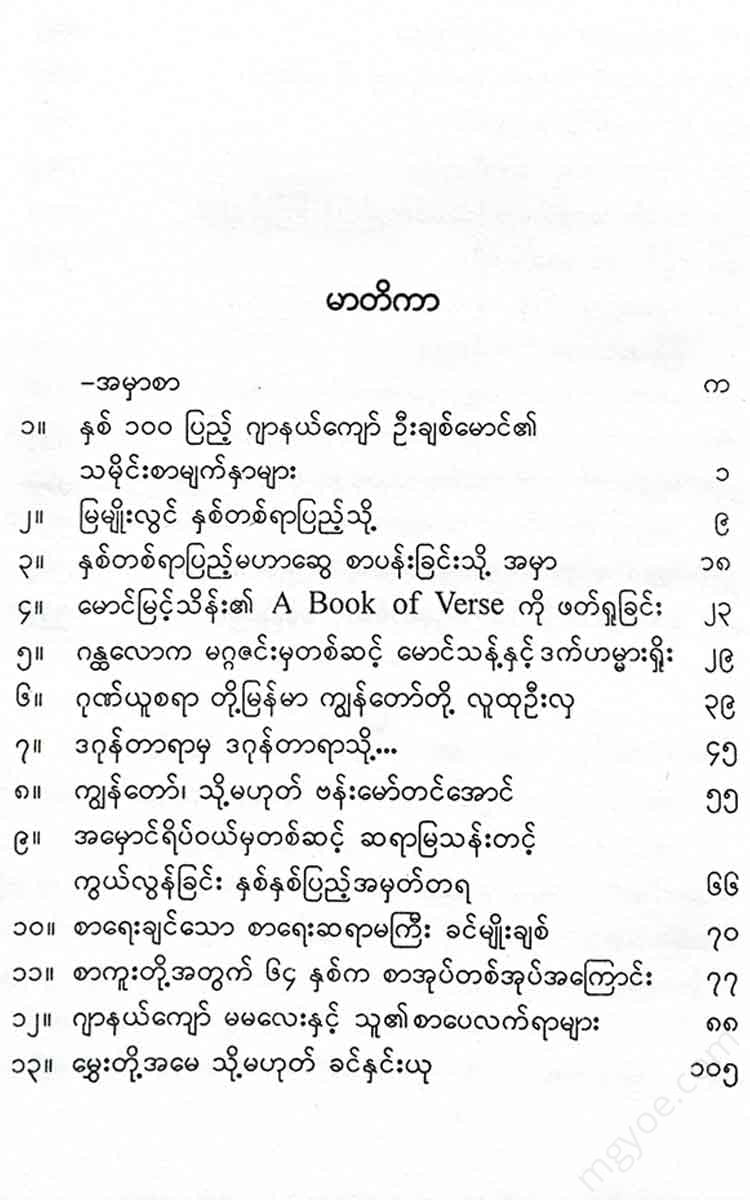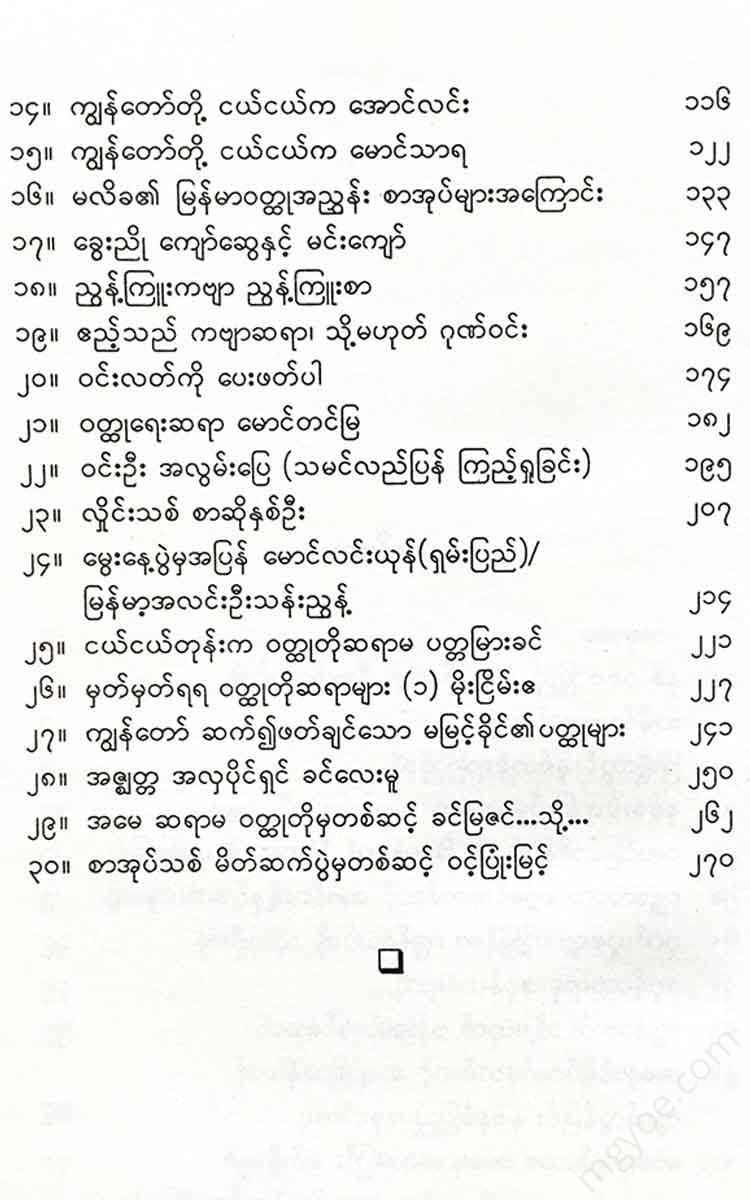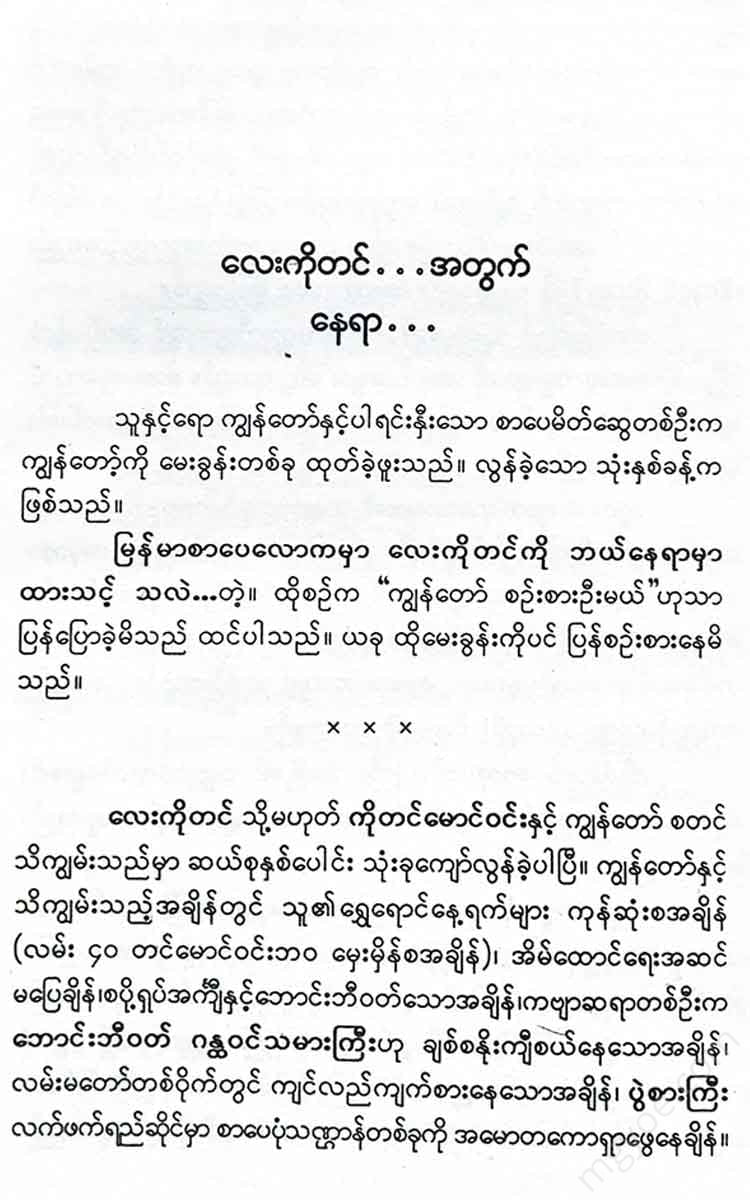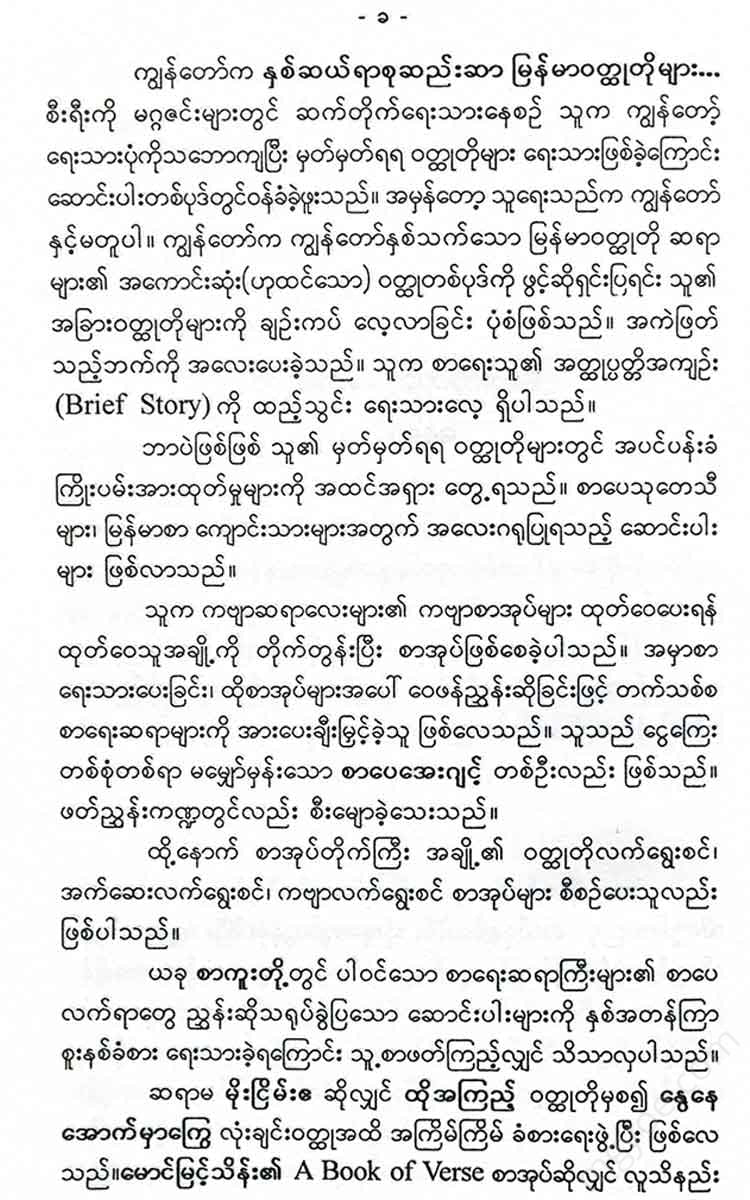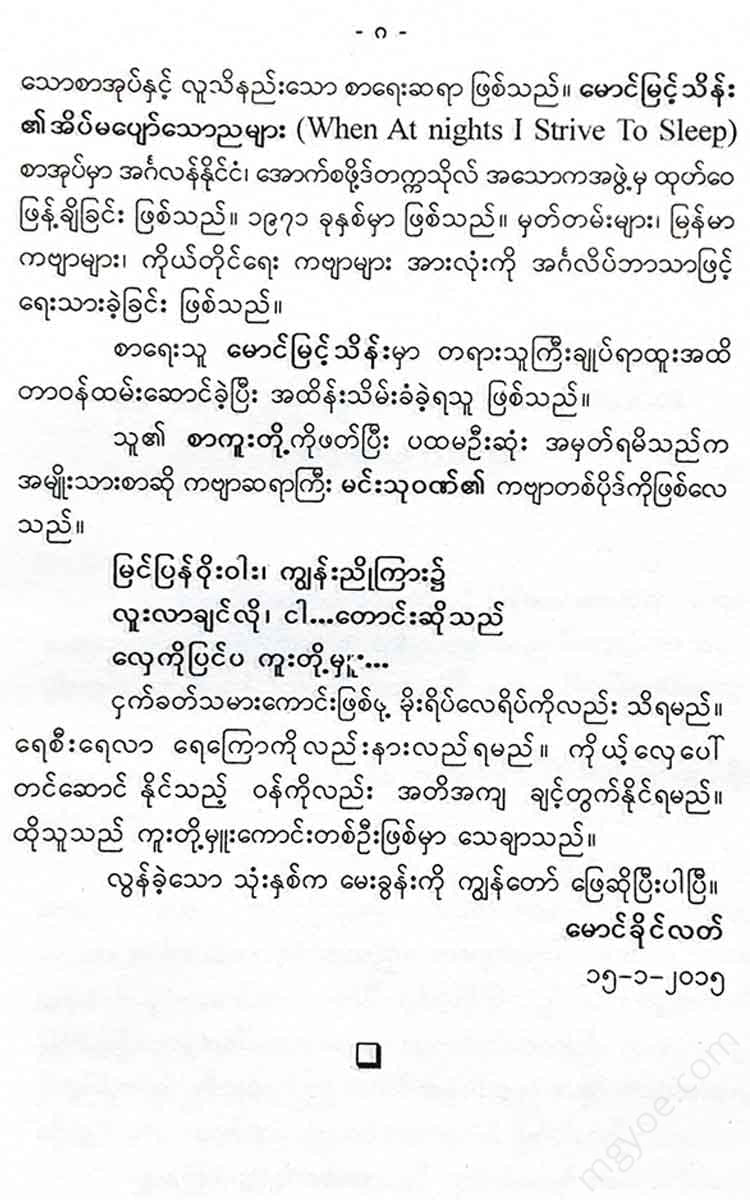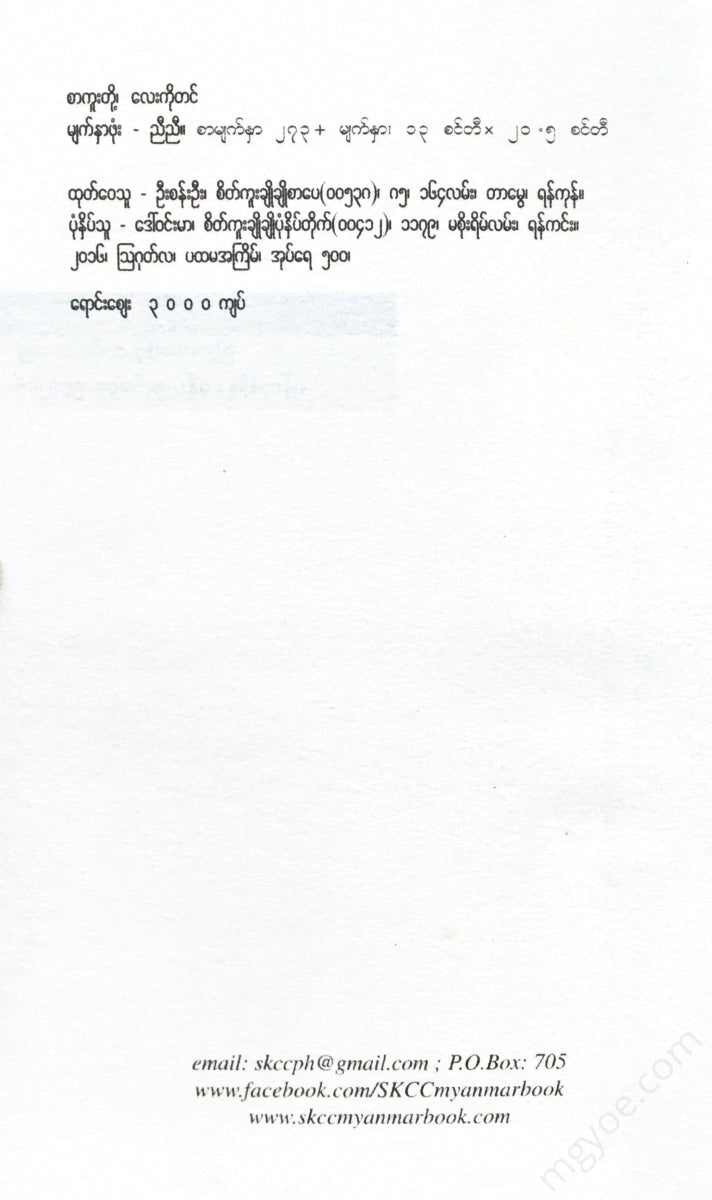စိတ်ကူးချိုချိုစာပေ
Bow - Pass the ball
Bow - Pass the ball
Couldn't load pickup availability
(1)
In the 20th century Burmese literature, centenary celebrations of great Burmese writers, poets, and journalists were held regularly. Among the great writers, Pi Moe Ning, Maha Swe, Zeya, Shwe U Daung, Saung Maung Wa, Dagon Khin Khin Lay, Poppa U Kyaw Yin, U Thaw Zin, and among the great poets, Zaw Gyi and Min Thu Wan were celebrated.
Among the great journalists, U Tun Pe, Moe Than U Ohn Khin, etc., have reached the age of one hundred, but they could only record it in one letter or one poem. Among the great writers, Khin Saw Mu, Dhu Wan, Maung Htin, Dagon U Tun Myint are also the same. Now, the centenary of the writer and journalist, Journal Kyaw U Chit Maung, will be celebrated in 2012.
Journalist U Chit Maung and Journalist Ma Malay are two of the most prominent writers, teachers, and journalists in the Burmese literary world. They served as editors of the “Myanmar Light” newspaper and “Journal Kyaw” during the country’s “Fourth Estate” from the pre-war era to the Japanese era and the CAS-B era.
Although the famous Journalist U Chit Maung passed away on April 9, 1946, his wife, Journalist Ma Malay, served as editor of the journals "Journalist Kyaw", "Pythut Hit Taing" and "Gantwawin" until the post-war period and the early years of independence.
Journal Kyaw Ma Malay documented the life and times of her husband, Journal Kyaw U Chit Maung, in a novel-style book called “A Man Like Him,” as if she were painting an oil painting. Now, it has been translated into English by author Ma Ma Ta Gi as “A Man Like Him.”
On the 15th anniversary of the death of Journalist U Chit Maung, a memorial service was held at Journalist Ma Malay’s house, No. 8, Pyithar Street, Bawk Htay Yat, Yangon. The mother Journalist Ma Malay and her children, daughter “Dr. Khin Lay Myint” (translated the French writer “Saint-Tropez’s “The Little Prince”), son “Maung Thein Tan” (wrote a book of short stories “The Little Prince” and made a movie “My Sister Let Go of the Moon”. He also acted as an actor), and son “Moe Hein” (Journalist Kyaw) [authored and published the book Harmony of Head and Heart, and the book Phat Ta Si Choe (Pictures, Metaphors, and Dhamma)], are among their father’s friends and relatives to remember the life of Journalist U Chit Maung as a journalist, writer, and politician.
(2)
Various historical records have been written about the famous journalist U Chit Maung, and the earliest record of his life is recorded in the Myanmar Encyclopedia, Volume 2.
“U Chit Maung was intelligent, worked hard and read constantly, and rose through the ranks from night editor to editor-in-chief at the Myanmar Light newspaper. As a newspaper editor, he was patriotic and courageous in expressing his views on issues that would benefit the country. While writing, he had a disagreement with the editor about freedom of expression, and in 1939 AD he resigned as editor.
Yes.
After resigning, he started publishing a newsletter under the name Journal Kyaw, which became very popular due to its clear criticism of politics and war.
As a book, it is also documented and compiled in Sanpya Tin Oo's book "Dictionary of Burmese Writers, or Famous Burmese Writers of the 20th Century" (published by Sanpya Publishing House in 1972).
“U Chit Maung can be said to be a man who speaks from the heart. He is a man of strong patriotism and love for the country. That is why, as the editor-in-chief of Myanmar Light, he would not hesitate to write anything that would benefit the country and the people. Because of these writings, he was often criticized by the ruling class, the imperialist dragon.”
Journalist U Chit Maung's mother, Daw Saw Yu, was the daughter of Minister U Kyin of Shwe Kyin. She was killed in a rebellion when the British colonialists took over Burma. In addition to her journalistic career, U Chit Maung played a key role in drafting the rules and regulations for the formation of the "F-S-P-L government" in the region.
It was mentioned as an appendix in the book “Thu Lo Lu” by Journalist Ma Malay.
(3)
U Chit Maung, a renowned journalist, played a leading role in various sectors of the Burmese literary world. The Burma Writer's Union, which was founded in 1940, was led by Chairman Deedok U Ba Cho and Vice Chairman Dagon Nat Shin, and U Chit Maung was also part of the executive committee. In 1939, he attended the Rangoon University Rowing Club's celebration of writer "HG Well".
In 1944 (Japanese era), the idea of creating a literary day came about after the employees of the Dictionary and Encyclopedia Department under the Myanmar Literature Association, chaired by Dr. Bahan (U Wun, U Mar Ga, Daw Ma Ma Kyi, U Yu Seng, Tat Toe, Catherine Khin Khin, etc.) celebrated “U Ponya Day.” A meeting was held and 11 literary scholars, including U Pe Maung Tin, attended.
At the meeting, there was discussion about choosing a day to celebrate Myanmar Writers' Day instead of U Ponya Day. Journalist U Chit Maung submitted a motion.
“During the reign of ancient Burmese kings, there was a tradition of awarding titles and honors to outstanding scholars, princes, and nobles during the month of Nat Daw. In keeping with this tradition, it was proposed that a day of Nat Daw should be chosen as Writers’ Day. This proposal was supported by Thuriya U Thein Maung (Chairman of the Writers’ Association), and the meeting unanimously approved the 1st day of the new moon of Nat Daw as Myanmar Writers’ Day.
This is what was written about Sasodaw Day in the latest article by journalist U Chit Maung, “Sasodaw Day Gyi.”
“When the gods return, they will be crowned with a crown of thorns, given titles, and given a name, and will be crowned with a crown of thorns
When the younger son of the famous journalist U Chit Maung, “Moe Hein (Thar Journal Kyaw),” became a poet and writer, he wrote about his father’s image in the article “About a bricklayer who learned more and more.” He wrote about the journey from Tamwe roundabout to Guttalik Market along U Chit Maung Road (I didn’t know Guttalik U Chit Maung, but I knew U Chit Maung..) and the lengths and breadths of his father’s life.
In the last chapter of this article (a funeral)...
“U Chit Maung was only 35 years old when he died. At U Chit Maung’s funeral, General Aung San began by saying, “We have lost an arm,” and ended by saying, “People like U Chit Maung should be sent to prison.”
At the funeral of journalist U Chit Maung, members of the PFLP, including General Aung San, politicians, journalists, poets, writers, relatives, friends, relatives, and the surviving wife and children walked from U Buri Zayet, south of Shwedagon Pagoda, to the Khindaung Cemetery, where they laid him to rest.
(4)
Journalist Ma Malay’s “A Man Like Him” or how journalist U Chit Maung chose his life partner is still a mystery. Today, the book “A Man Like Him” has been published in both Burmese and English, and in the literary community of Cornell University in the United States, it has been many years since we have understood the life background of such a journalist, such an editor, such a writer, but we can even hear voices saying that it would be good if we had understood it more than 50 years ago.
We read in the article "Hla Kyunt's "Charlie Wailin, or...." how U Chit Maung, a famous journalist who has reached the world literary circle, chose Ma Malay, a famous journalist, as his life partner.
“Journalist U Chit Maung really likes the novel “Ki.” He reads the novel “Ki” over and over again. He seems to want to be a good journalist like “Ki.” He also seems to like “Ki’s” lover “Shali Wai Lin” in the novel “Ki.” “Shali Wai Lin” helped “Ki” in every way to become a good journalist. He helped “Ki” not to be sad and to do whatever he wanted.
It's hard to say whether U Chit Maung is attracted to "Ki" or not, but it's likely that he also desires a womanizer like "Shali Welin".
Now U Chit Maung has arrived.
In fact, Daw Tin Hlaing has become U Chit Maung's "charlie welch." U Chit Maung is lucky.
In Dagon Tara's book "Pictures," he describes the picture of the famous journalist Ma Ma Lai as "a flower of love."
“It was at the house of General Lek Ya in Shwe Taunggyi during the Japanese era. One evening, U Chit Maung and his wife came to visit. I was playing the piano. At that moment, U Chit Maung vomited, saying he was drunk. His wife was taking care of him from the crowd, so she asked me to give her a glass of water.”
Share
